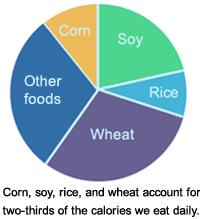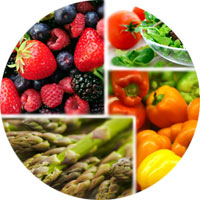Food As Medicine

Food as medicine: Getting a perspective
Americans are bombarded with information about "healthy eating," but we suffer from higher rates of obesity and chronic disease than ever before. We are told one year to avoid fat and the next to avoid carbohydrates. It is enough to make anyone distrust nutritional advice altogether, particularly anything that claims that "food is medicine."
And in many ways, we don't really need much advice because we already know basically what we should do: eat a variety of foods, especially whole grains, fruits, and vegetables; minimize candy, soda and other empty calories; and watch how much we eat. And of course do some physical activity each day.
Then why do we have all the complicated nutritional advice, contradictory research studies, and endless health diets? In part because they give the food companies a way to sell more products. And on our side of the table, it is often easier to read about what we should do, then actually change our eating patterns. As a result, our Standard American Diet (SAD) is not contributing to our health.
What are some of the issues with our diet?
As a nation, we are increasingly eating more processed foods. Our supermarkets are full of convenient packaged foods that appeal to our taste buds, but compromise our nutrition. Because most of these foods' natural nutrients are removed in the refining process, we need to get them elsewhere.
 In addition, we are eating less variety of foods. Ironically, while 17,000 new products are introduced each year, two-thirds of our calories come from just four foods: corn, soy, wheat, and rice.
In addition, we are eating less variety of foods. Ironically, while 17,000 new products are introduced each year, two-thirds of our calories come from just four foods: corn, soy, wheat, and rice.
Nor is our food the same as it was 20 years ago. Nutrients in the soil have been depleted, so food grown in that soil has fewer nutrients. Chemicals are increasingly used in raising both plants and animals, particularly on huge industrial farms that specialize in a few products.
It is easy to fall into the pattern of eating fast, convenient, prepared food, especially in our often frenetic lives. But we are not nurturing ourselves by doing so. Our Standard American Diet lacks nutrients and relies heavily on processed foods that include artificial color, additives, flavorings, and chemically-altered fats and sweeteners.
Our fast foods also remove us from the pleasures of creating and savoring a wonderful meal, and our fast pace often prevents us from connecting over a good, slow meal. We tend to eat for convenience and speed, not health and pleasure.
So there are many reasons why we might want to pay attention to what we eat. We especially need to pay attention when we are sick so we can help our bodies get the nutrients we need to heal. There are many health benefits if we look at food as medicine.
What's in this website?
This website begins by explaining the connection between nutrition and your health. See How Does Food Impact Health?
It offers some simple guidelines about how to make good choices that will lead to better overall health (how to shop, how to cook, what to include, and what to avoid in your diet). If you follow just these guidelines, or even pick one to start with, you will be starting down a path to better health. See How Should I Start?
 If you want to be more deliberate in improving health-perhaps to address a chronic disease or condition-you can read about an approach that is based on a Functional Medicineperspective. This perspective considers how various nutrients interact with the systems of the human body. See What Do Specific Foods Do? and What Should I Eat for My Specific Condition? for more information.
If you want to be more deliberate in improving health-perhaps to address a chronic disease or condition-you can read about an approach that is based on a Functional Medicineperspective. This perspective considers how various nutrients interact with the systems of the human body. See What Do Specific Foods Do? and What Should I Eat for My Specific Condition? for more information.
But we also want to acknowledge the full role that food plays in our lives. We don't eat only to provide our body with specific nutrients-we eat for pleasure and for the connection to family and friends. Our food is an expression of our community, culture, and relationship to the natural world. It is about relationships. We discuss this in Why Being Mindful Matters and How Are Food and the Environment Related?
It is our hope that the guidelines and suggested diets found within this website will help you create good, simple food that is tremendously satisfying and begs to be shared. We hope that you learn how food can truly be a delicious medicine and how you can eat for health and pleasure.
Expert Contributor:
Carolyn Denton, LN
Reviewed by:
Karen Lawson, MD; Linda Armstrong, RD, LD, MBASource: http://www.takingcharge.csh.umn.edu/explore-healing-practices/food-medicine
No comments:
Post a Comment